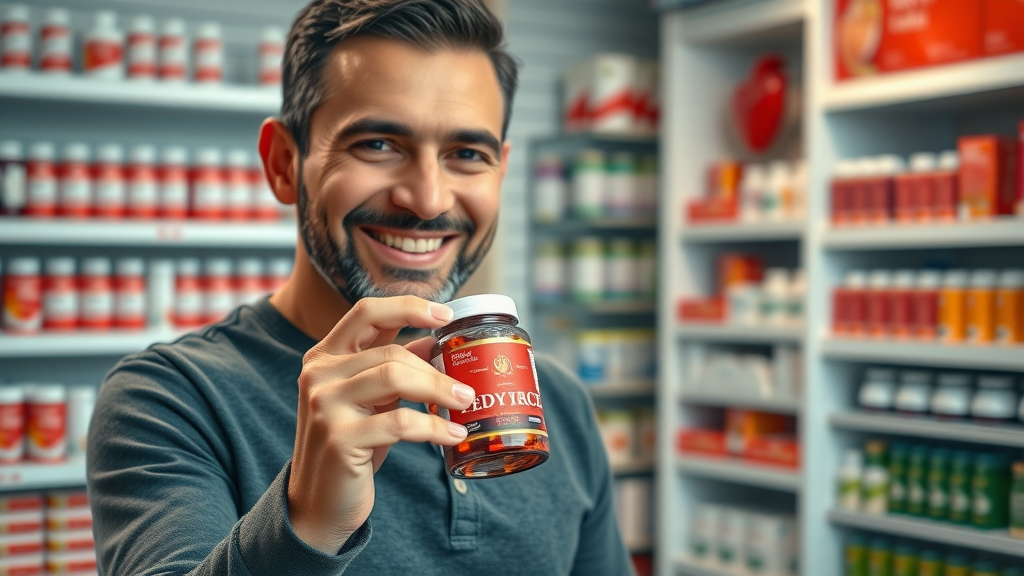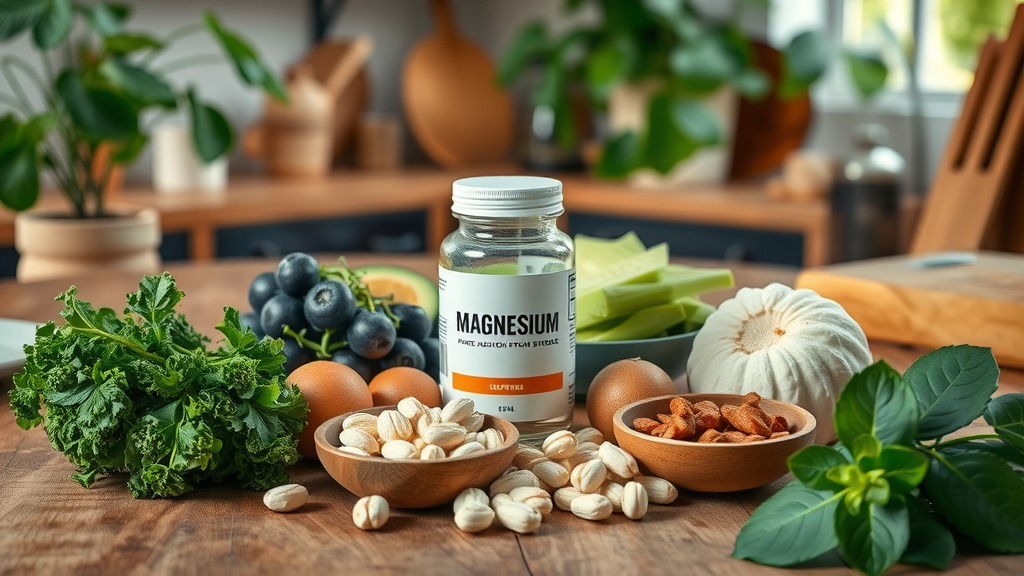Did you know that heart disease remains the leading cause of death worldwide, claiming millions of lives annually? Even for those in seemingly good health, hidden risk factors can dramatically increase your vulnerability. But there’s good news—recent research reveals that the best supplements for heart health can offer powerful support for maintaining a resilient, healthy heart. Read on to uncover the scientific truth and practical tips for protecting your heart today.
Why the Best Supplements for Heart Health Matter More Than Ever
The burden of heart disease and cardiovascular disease affects every community, family, and individual. In fact, the increasing prevalence of unhealthy diets, sedentary lifestyles, and growing stress has created a global health crisis. Taking steps to prioritize heart health is crucial—supplements can bridge nutritional gaps that standard diets often leave behind. By understanding the best supplements for heart health, you can proactively address risk factors like high blood pressure , high cholesterol, and systemic inflammation.
Equipping yourself with knowledge about heart health empowers you to make better daily choices. Many of the most effective dietary supplements—like fish oil , red yeast rice , and folic acid —work in tandem with healthy lifestyle changes, providing key nutrients proven to support cardiovascular function. Embracing these supplements is not just about living longer—it’s about living stronger and feeling your best now and in the years to come.

"Over 17.9 million people die each year from cardiovascular disease—making heart health a priority for everyone." – World Health Organization
Maximize Heart Health: How the Best Supplements for Heart Health Support Your Wellbeing
The modern nutrition landscape makes it difficult to obtain all the essential nutrients for optimal heart health from food alone. This is where a targeted approach—choosing the best supplements for heart health —can make all the difference in reducing your risk of heart disease, maintaining regular blood pressure, and supporting vascular health. Let’s break down what you’ll learn in this comprehensive guide:
- The science behind the best supplements for heart health
- Which vitamins and minerals truly benefit your heart
- The important roles of fish oil , red yeast rice , and folic acid
- How to safely incorporate supplements into your daily routine
Understanding Heart Health: Causes, Risks, and the Impact of a Healthy Diet
A healthy diet is the cornerstone of strong cardiovascular function, but it’s not simply about avoiding “bad” foods. High levels of processed sugars, unhealthy fats, and sodium are well-known contributors to vascular disease . However, even with an ideal diet, some people have inherited or age-related risks, such as elevated cholesterol, high blood pressure, or a family history of heart issues. This is why many experts recommend considering suitable dietary supplements as an adjunct to your existing diet and exercise habits.
Historically, populations with plant-based diets, high in omega-3 fatty acids , fiber, and micronutrients, have lower rates of coronary heart disease and heart failure . Yet, in today’s fast-paced world, even the most health-conscious individuals can fall short on essential nutrients. Supplements for heart health can target these deficits, supporting not just the organs but also overall wellness, energy, and longevity.
How Lifestyle and Nutrition Affect Heart Disease and Vascular Disease
Lifestyle choices—such as regular exercise, avoiding tobacco, managing stress, and eating a variety of whole foods—play a critical role in preventing heart disease . Poor choices, especially over time, can lead to chronic inflammation, high blood pressure, and arterial plaque buildup—common precursors to vascular disease . Supplements like fish oil and red yeast rice are supported by research to help counteract these effects by lowering triglycerides, supporting healthy cholesterol, and nourishing the vascular system.
Nutrition is more than calorie counting; it’s also about nutrient density. Even with a healthy diet , essential vitamins and minerals —like magnesium, potassium, and vitamin D—can be insufficient. Studies indicate that carefully chosen supplements can correct common deficiencies, optimize metabolic processes, and reduce the risk of life-altering cardiovascular events. In many cases, supplements are most beneficial when paired with positive lifestyle shifts and the guidance of a medical professional.

The Role of Cardiovascular Disease in Overall Health
Cardiovascular disease is not just about heart attacks—it includes conditions affecting the blood vessels, like stroke , peripheral artery disease, and chronic high blood pressure. Left unmanaged, these conditions can lead to serious complications—impacting the brain, kidneys, and even your quality of life. Keeping your cardiovascular system healthy helps maintain steady energy, mental clarity, and resilience against both acute and long-term illnesses.
Scientific advances are making it clear: the heart and blood vessels are intricately linked to nearly every aspect of health. Supplements for heart health, when chosen wisely, have been shown to support blood flow, enhance nutrient and oxygen delivery, and even influence the body’s inflammatory response. Embracing a holistic approach to heart health—balanced nutrition, key supplements, and an active lifestyle—helps protect your wellbeing at every stage of life.
| Key Supplements for Heart Health | Primary Benefit | Supporting Study |
|---|---|---|
| Fish Oil | Lowers triglycerides | The American Journal of Clinical Nutrition (2020) |
| CoQ10 | Supports cellular energy | Mayo Clinic Proceedings (2019) |
| Red Yeast Rice | Promotes healthy cholesterol | Journal of the American Heart Association (2017) |
| Folic Acid | Supports healthy homocysteine levels | Journal of Nutrition (2019) |
| Magnesium | Helps lower blood pressure | Hypertension Journal (2022) |
| Vitamin D | Reduces inflammation | Circulation Research (2021) |
Exploring the Best Supplements for Heart Health: Top Options Backed by Science
When it comes to the best supplements for heart health , scientific evidence points to a select group of potent nutrients. These supplements address key risk factors for heart disease by targeting inflammation, improving blood lipid profiles, and supporting overall vascular health. Understanding the unique benefits of each supplement allows you to tailor your choices to your specific needs and maximize the protective effects for your cardiovascular system.
From fish oil supplements to CoQ10 and red yeast rice , research continues to demonstrate their efficacy in lowering the risk of heart attack , managing cholesterol levels , and even improving energy and stamina. Most importantly, these supplements work best when adopted alongside a healthy diet and lifestyle, offering comprehensive support as you strive to feel your very best.
Fish Oil: Omega-3 Fatty Acids for Heart Disease Prevention and Lower Blood Pressure
Fish oil supplements are one of the most extensively studied and proven best supplements for heart health. Rich in omega-3 fatty acids (EPA and DHA), fish oil helps to lower triglycerides, moderate blood pressure, and reduce overall inflammation in blood vessel walls. Studies show that individuals who regularly consume adequate omega-3s have a lower risk of experiencing a heart attack or developing heart failure .
Not all fish oil supplements are created equal, so choosing a high-quality, purified source is essential for safety and efficacy. Importantly, the American Heart Association recommends omega-3 fatty acids through fish oil or cold-water fish for supporting heart health . The benefits extend beyond the heart, with emerging research linking omega-3s to improved brain health and balanced mood.

CoQ10: Cellular Energy and Cardiovascular Disease Protection
CoQ10 (coenzyme Q10) is a naturally occurring antioxidant that is critical for cellular energy production—a function vital for the heart muscle, which is constantly at work. Supplementation with CoQ10 is linked to improved blood vessel function, lower blood pressure, and a reduction in oxidative stress associated with cardiovascular disease .
Recent clinical trials indicate that individuals with chronic heart conditions, such as hypertension or heart failure , may benefit most from CoQ10 supplementation. Taking CoQ10 can also help offset some nutrient losses caused by cholesterol-lowering statin medications. Consult your healthcare provider to determine if CoQ10 is appropriate for your specific risk factors or health status.
Red Yeast Rice: Supporting Cholesterol and Healthy Blood Lipids
Red yeast rice is a unique supplement derived from fermented rice and contains naturally occurring compounds similar to statin drugs. Studies have shown that red yeast rice can help lower LDL ( bad cholesterol ) levels, thus reducing the risk of coronary heart disease . For those who cannot tolerate prescription statins or are seeking a natural approach, red yeast rice offers a potent, research-supported option.
While red yeast rice is effective, it is essential to use standardized products—quality varies greatly among brands. In addition, users should be aware of possible side effects and drug interactions. Always seek medical advice before starting red yeast rice, particularly if you are taking other cholesterol-lowering medications.

Folic Acid: Reducing Risk Factors for Heart Health and Vascular Disease
Folic acid , or vitamin B9, plays a significant role in metabolizing homocysteine, an amino acid that—at high levels—contributes to vascular disease and cardiovascular risk. Supplementing with folic acid can lower homocysteine and help prevent arterial damage commonly associated with high risk of heart disease .
Folic acid is especially important for those with family histories of heart issues, those who smoke, or those consuming diets low in leafy greens and legumes. For comprehensive heart protection, many experts recommend combining folic acid with vitamins B6 and B12, further supporting a healthy vascular system.
Magnesium: How This Mineral Supports Blood Pressure and the Heart
Magnesium is an underrated powerhouse for heart health . Essential for regulating rhythm, muscle contraction, and fluid balance, magnesium supplementation has been shown to effectively lower blood pressure , especially in individuals with mild hypertension. It is also critical for preventing abnormal heart rhythms, which can lead to heart failure or stroke.
Many diets lack sufficient magnesium due to soil depletion and processed foods, making supplementation especially valuable. Choosing a chelated or magnesium citrate form can enhance absorption and minimize digestive discomfort. Working magnesium into your regimen supports both heart and nerve health for true whole-body benefits.

Vitamin D: Immune Support and Heart Disease Risk Management
Vitamin D is best known for its role in bone health, but research now shows strong links to heart health and immune resilience. Deficiency in vitamin D correlates with higher rates of heart attack , heart failure , and high blood pressure . Supplementing with vitamin D can help reduce inflammation, regulate blood pressure, and improve vascular function.
Since sun exposure is inconsistent for many, particularly in winter or for those with darker skin tones, supplementation may be necessary. Regular monitoring and consultation with your doctor ensure the right dosage for your individual needs and maximize vitamin D’s protective cardiovascular effects.
Essential Vitamins and Minerals for Heart Health: A Comprehensive Guide
While headline supplements like fish oil or red yeast rice often grab attention, a comprehensive approach demands attention to foundational vitamins and minerals . These micronutrients interact synergistically to support electrical impulses in the heart muscle, reduce vascular stiffness, balance fluid levels, and detoxify the body.
- Potassium
- Calcium
- Vitamin B6 and B12
- Selenium
- Vitamin K2
Deficiencies in any of these can increase the risk of heart disease . Micronutrient supplementation is best when paired with dietary improvements—they’re not a substitute, but a powerful adjunct to a healthy diet rich in fruits, vegetables, lean proteins, and whole grains.
How Supplements Can Help Lower Blood Pressure and Manage Heart Disease
Elevated blood pressure increases the risk of heart attack , stroke, and kidney issues. Many best supplements for heart health—especially fish oil, magnesium, and potassium—play key roles in relaxing blood vessels and supporting efficient heart contractions. Consistent supplementation, along with lifestyle strategies, provides a proactive way to manage or even reverse early-stage heart disease .
Remember, no supplement replaces medications prescribed for diagnosed hypertension, but under medical supervision, they may enhance your results or help you use lower doses of medication.
The Relationship Between Supplements, Healthy Diet, and Blood Pressure
Diets rich in plant-based food sources and low in sodium have long been linked to heart health. Supplements can fill the gap where diets fall short—consider potassium, magnesium, and omega-3s as examples that directly influence vascular tone and lower blood pressure . Paired with regular exercise and weight management, supplements offer holistic blood-pressure management.
If your dietary patterns contain processed foods or limited produce, supplements may be especially important. Consistency is key — most benefits are seen after weeks or months of consistent supplementation, combined with positive changes in physical activity and stress reduction habits.
Evidence-Based Benefits: Lowering Blood Pressure with Key Supplements
The evidence for supplements’ benefits on blood pressure is robust. Multiple studies demonstrate that omega-3 fatty acids , magnesium, and coenzyme Q10 can yield modest but clinically meaningful reductions in both systolic and diastolic blood pressure. These effects help protect the arterial lining and may prevent complications down the road.
It’s worth noting that individual responses may vary. Monitoring blood pressure at home, in addition to regular check-ups, can help you and your healthcare team evaluate the effectiveness of your supplement routine and adjust as needed for long-term safety.

Combining Supplements With Lifestyle Changes for Maximized Heart Health
Supplements should complement—not replace—other pillars of heart wellness. Regular physical activity, stress management, quitting smoking, and balanced eating form the foundation. Adding the right supplements acts as an advanced layer of protection, targeting specific risk factors or deficiencies unique to your body and lifestyle.
For instance, combining a fish oil supplement with a healthy diet high in antioxidants, and incorporating periodic check-ups, boosts the overall benefits. The real secret to long-lasting heart health ? Consistency, moderation, and close partnership with your healthcare providers.
Understanding Risks and Side Effects of Heart Supplements
Despite the promising benefits, not every supplement is risk-free. It’s essential to be aware of potential side effects , interactions, and the importance of working with trusted brands. The quality and purity of your supplements are as crucial as the ingredients themselves. Always check for third-party certifications and be wary of exaggerated claims.
Overuse or misuse—even of natural compounds—can cause unwanted effects, ranging from mild digestive complaints to more serious kidney or liver problems. Personalized medical advice ensures that you’re using supplements in the safest, most effective way possible.
Side Effects of Popular Heart Health Supplements: What You Need to Know
Omega-3 fish oil supplements are generally well-tolerated but may cause minor digestive symptoms in some users, such as burping or upset stomach. Large doses of omega-3s can thin the blood, so caution is advised if you’re already using anticoagulants. CoQ10 is usually safe but may rarely interact with blood pressure or diabetes medications.
Red yeast rice can have side effects similar to prescription statins—muscle aches, mild elevations of liver enzymes, or digestive upset. Quality and potency vary, so consult your physician for brand guidance and proper monitoring. Lastly, excessive magnesium can lead to loose stools or, in rare cases, cardiovascular irregularities.
Red Yeast Rice: Adverse Effects and Safety Considerations
While red yeast rice is a natural choice for supporting healthy cholesterol levels, it is not appropriate for everyone. Some formulations contain monacolin K, a compound chemically identical to lovastatin, which can cause significant side effects for sensitive individuals. These may include muscle pain, fatigue, and increases in certain liver enzymes.
Pregnant women, those with liver disease, or individuals already taking statins should avoid red yeast rice . Always confirm product integrity and absence of contaminants with your healthcare provider before beginning supplementation.

Precautions for Combining Supplements and Prescription Medications
If you are taking prescription medications, especially for blood pressure , cholesterol, or blood thinners, consult your doctor before starting a new supplement. Interactions can impact the effectiveness of both your prescriptions and the supplement, potentially causing harmful side effects.
In addition to periodic laboratory screening, keep a current list of all your supplements to share with your healthcare providers. This transparent communication helps maximize the benefits and safety of your heart health strategy.
Choosing the Best Supplements for Heart Health: Expert Recommendations
Making informed choices requires more than picking a popular brand off the shelf. Here’s how to choose the right supplements with confidence:
- Check for clinical evidence and trusted third-party testing
- Assess your specific heart health needs and risk factors
- Consult your doctor or cardiologist before starting a new supplement
- Avoid unproven or risky products with exaggerated claims
Medical professionals and organizations like the American Heart Association continuously review emerging research, so ongoing partnership with your healthcare team is key to long-term results and safety.
What is the best supplement for the heart?
Expert Consensus and Research Findings
While there’s no one-size-fits-all answer, the majority of experts agree that omega-3 fatty acids from fish oil , CoQ10 , and red yeast rice top the list for heart protection, lowering the risk of heart disease and supporting vascular health. Your ideal choice depends on your medical history, cholesterol and blood pressure levels, and overall health. The secret to success is personalization—tailoring your supplement choices and lifestyle for your unique profile.
Continued research supports these supplements’ benefits. However, always use them as part of a broader wellness plan rather than as magic bullets. Regular check-ins with your doctor ensure the safest, most productive outcomes.

What is the best supplement to unclog arteries?
Key Substances Known for Supporting Artery Health
No supplement can literally “unclog” arteries, but some compounds support vascular health and help slow or prevent the accumulation of plaque. Omega-3 fatty acids (fish oil), red yeast rice , folic acid , and magnesium are recognized for improving endothelial function and promoting optimal blood flow, which in turn helps keep the arteries clear and flexible.
For lasting results, these should be combined with diet and lifestyle modifications—lowering saturated fat intake, exercising regularly, and controlling stress—as cornerstones of arterial wellness.
Which vitamin is most beneficial for heart health?
The Impact of Vitamin D, B Vitamins, and Antioxidants
Among the vitamins and minerals for heart health, Vitamin D stands out for its anti-inflammatory and blood pressure-lowering properties. B vitamins, including folic acid (B9) , B6, and B12, have demonstrated benefits in lowering homocysteine and supporting healthy arteries. Antioxidants like vitamin C and E help protect blood vessels from oxidative stress. Each of these plays a unique and complementary role in reducing your risk of heart disease and managing risk factors .
Getting enough of these nutrients—through diet or supplements—ensures your heart’s protective systems remain robust.
What do cardiologists say about CoQ10?
Cardiologist Insights and Recommendations on CoQ10 for Heart Health
Most cardiologists recognize CoQ10 as a valuable adjunct for individuals on statins or those with chronic heart disease, citing improved energy, fewer muscle-related side effects, and better overall heart function. The evidence continues to grow, and while it’s not a substitute for prescribed therapies, CoQ10 is widely recommended by heart specialists because of its strong safety record and well-documented cardiovascular support.
Always speak with your medical provider before starting CoQ10, especially if you take multiple medications or have complex health conditions.
Most Frequently Asked Questions About the Best Supplements for Heart Health
-
Can supplements replace a healthy diet for heart health?
No, supplements are intended to fill nutritional gaps, not serve as a replacement for a balanced, healthy diet . Real food provides fiber, synergy of nutrients, and natural phytochemicals that cannot be fully replaced by pills. -
How long does it take to see benefits?
Benefits from heart supplements are typically observed after several weeks to months of consistent use. It may take longer for cholesterol or blood pressure effects to be measurable; consistency and lifestyle changes help accelerate noticeable improvement. -
What is the safest way to add supplements to my regimen?
Start with one supplement at a time, select quality-tested products, and consult with your doctor—especially if you take prescription medications or have pre-existing conditions. Periodically review your regimen for necessity and efficacy as you progress.
Key Takeaways for Achieving Better Heart Health with the Best Supplements
The best supplements for heart health should always complement, not replace, a healthy diet and active lifestyle. Evidence-backed choices—like fish oil , CoQ10 , red yeast rice , and critical vitamins—can significantly support your cardiovascular wellness when chosen and used wisely. Regularly consult your healthcare provider and monitor your progress for lasting results.
Take the First Step Toward a Healthier Heart With the Best Supplements for Heart Health
"The journey to better heart health begins with one informed decision. Take yours today."
Begin your journey to a healthier heart – with Cardio Shield! Click here now...
Why choosing Cardio Shield can make a difference in your quest for heart health
Cardio Shield is formulated based on cutting-edge research to deliver vital nutrients that protect your heart, lower blood pressure, and support healthy cholesterol levels—all in one convenient product. Trusted by healthcare professionals and rigorously tested, Cardio Shield is your ally in the pursuit of a stronger, safer heart.
Animated explainer showing how fish oil , CoQ10 , and red yeast rice work inside your body, with clear, expert-backed recommendations.
Watch to learn how these powerful supplements influence cardiovascular health, reduce cholesterol, and promote overall wellness with insights from leading experts.
Get direct guidance from top cardiologists on the safest, most effective heart supplements for your individual needs—empower your wellness journey today!
 Add Element
Add Element  Add Row
Add Row 



Write A Comment